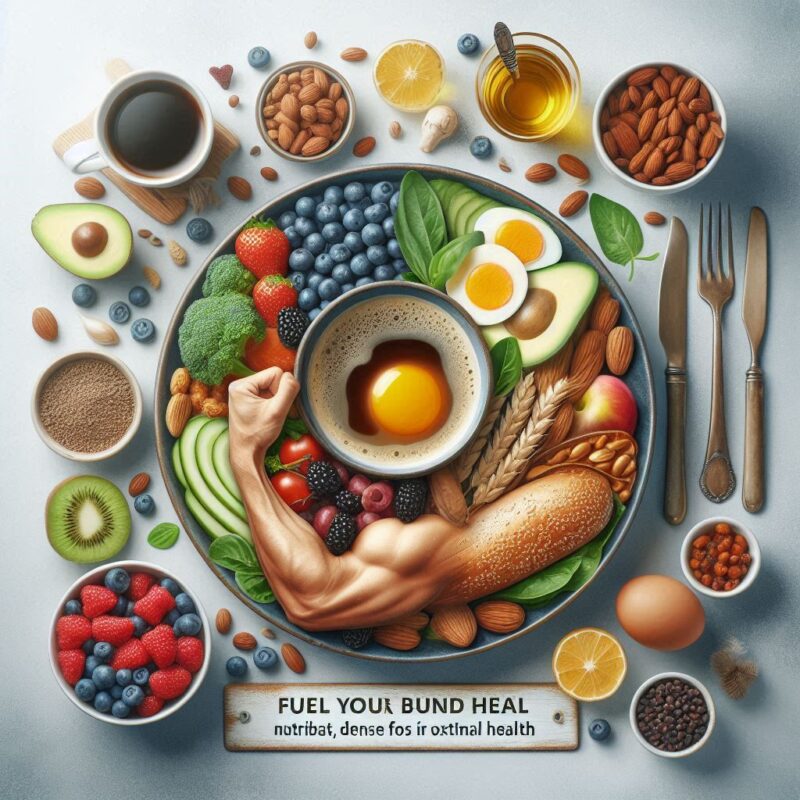Healthy Eating
Fuel Your Body: Nutrient-Dense Meals for Optimal Health

Fuel Your Body: Nutrient-Dense Meals for Optimal Health emphasizes the importance of consuming foods that provide the maximum amount of nutrients for the fewest calories. This approach focuses on whole, unprocessed foods rich in vitamins, minerals, antioxidants, fiber, healthy fats, and lean proteins. Eating nutrient-dense meals helps maintain energy levels, supports overall health, boosts immunity, and can aid in weight management.
What is Nutrient Density?
Nutrient-dense foods provide a high concentration of nutrients (like vitamins, minerals, and fiber) relative to their calorie content. By focusing on these types of foods, you’re giving your body the essential nutrients it needs to function optimally without excess calories from sugars or unhealthy fats. Nutrient-dense foods are typically whole and minimally processed, including fresh vegetables, fruits, lean proteins, whole grains, and healthy fats.
Key Components of Nutrient-Dense Meals:
- Lean Proteins:
- Chicken, Turkey, and Lean Cuts of Beef: These provide high-quality protein for muscle repair and immune support while being low in saturated fat.
- Fish and Seafood: Rich in omega-3 fatty acids, fish like salmon, tuna, and sardines support brain health, heart health, and reduce inflammation.
- Plant-Based Proteins: Lentils, beans, chickpeas, tofu, and tempeh provide protein along with fiber, iron, and essential nutrients.
- Colorful Vegetables:
- Dark Leafy Greens: Kale, spinach, Swiss chard, and collard greens are packed with vitamins A, C, and K, as well as iron and calcium.
- Cruciferous Vegetables: Broccoli, cauliflower, Brussels sprouts, and cabbage are high in fiber and compounds that promote detoxification and reduce cancer risk.
- Bright Red, Orange, and Yellow Veggies: Bell peppers, sweet potatoes, carrots, and squash are loaded with beta-carotene, which supports vision and skin health.
- Whole Grains:
- Quinoa, Brown Rice, and Oats: These whole grains are high in fiber, B vitamins, and minerals like magnesium, which help regulate blood sugar, support digestion, and improve energy levels.
- Amaranth and Millet: Ancient grains that provide a gluten-free alternative to wheat, packed with protein, fiber, and antioxidants.
- Healthy Fats:
- Avocados: Rich in monounsaturated fats, avocados support heart health and provide a creamy, satisfying texture to meals.
- Nuts and Seeds: Almonds, walnuts, chia seeds, flaxseeds, and hemp seeds provide essential fatty acids, fiber, and plant-based protein.
- Olive Oil: A staple of the Mediterranean diet, olive oil is high in antioxidants and heart-healthy fats.
- Fruits:
- Berries: Blueberries, strawberries, raspberries, and blackberries are low in calories but high in antioxidants, fiber, and vitamin C, supporting brain health and reducing inflammation.
- Citrus Fruits: Oranges, lemons, and grapefruits are packed with vitamin C and flavonoids, which boost the immune system and protect against oxidative stress.
- Tropical Fruits: Mangoes, papayas, and pineapples offer unique enzymes and vitamins that support digestion and skin health.
- Legumes and Beans:
- Lentils, Chickpeas, and Black Beans: High in protein, fiber, and essential nutrients like iron, legumes help maintain stable blood sugar levels and provide long-lasting energy.
- Herbs and Spices:
- Turmeric, Ginger, and Garlic: Known for their anti-inflammatory and antioxidant properties, these spices enhance flavor while supporting immunity and reducing inflammation.
Sample Nutrient-Dense Meals:
- Breakfast:
- Vegetable Frittata with Spinach and Mushrooms: Loaded with veggies and lean protein from eggs, this frittata provides a balanced mix of fiber, vitamins, and protein.
- Overnight Oats with Chia Seeds and Berries: Soak oats with chia seeds and top with antioxidant-rich berries for a nutrient-dense, fiber-packed start to the day.
- Lunch:
- Quinoa and Kale Salad with Grilled Chicken: A hearty salad with quinoa, kale, cherry tomatoes, and grilled chicken, drizzled with olive oil and lemon. This meal is full of protein, fiber, vitamins, and healthy fats.
- Lentil and Vegetable Soup: A comforting, nutrient-rich soup made with lentils, carrots, spinach, and celery for a warm, satisfying meal packed with plant-based protein and fiber.
- Dinner:
- Baked Salmon with Roasted Sweet Potatoes and Broccoli: Salmon provides omega-3s, while the sweet potatoes and broccoli add fiber, antioxidants, and vitamins for a well-balanced, nutrient-dense dinner.
- Stir-Fried Tofu with Brown Rice and Vegetables: Tofu, stir-fried with bell peppers, carrots, and bok choy, served over brown rice. This meal is a great source of plant-based protein, fiber, and essential nutrients.
- Snacks:
- Greek Yogurt with Almonds and Honey: Rich in protein, calcium, and healthy fats, this snack is satisfying and nutrient-packed.
- Hummus with Carrot and Cucumber Sticks: A simple yet nutritious snack, providing protein, fiber, and vitamins from the chickpeas and veggies.
Benefits of Nutrient-Dense Meals:
- Sustained Energy: Nutrient-dense meals provide slow-releasing energy from whole foods, preventing energy crashes and keeping you full longer.
- Immune Support: A diet rich in vitamins, minerals, and antioxidants helps strengthen the immune system, supporting the body’s natural defenses.
- Weight Management: Nutrient-dense meals are satisfying and help control hunger, making it easier to maintain a healthy weight without feeling deprived.
- Improved Digestion: The high fiber content in nutrient-dense foods supports gut health, improving digestion and reducing bloating.
- Disease Prevention: Nutrient-dense foods are full of anti-inflammatory compounds, antioxidants, and vitamins that reduce the risk of chronic diseases like heart disease, diabetes, and cancer.
Tips for Creating Nutrient-Dense Meals:
- Eat the Rainbow: Include a variety of colorful vegetables and fruits in your meals to ensure you’re getting a wide range of nutrients.
- Choose Whole Grains: Swap refined grains like white bread and pasta for whole grains like quinoa, brown rice, and oats for added fiber and nutrients.
- Incorporate Healthy Fats: Add avocados, nuts, seeds, and olive oil to your meals to boost satiety and heart health.
- Limit Processed Foods: Stick to whole, unprocessed foods that are naturally nutrient-dense to avoid empty calories and harmful additives.
By focusing on nutrient-dense meals, you ensure that your body gets the fuel it needs to function at its best, supporting optimal health, sustained energy, and long-term wellness.
Would you like more recipe ideas or tips for preparing nutrient-dense meals?